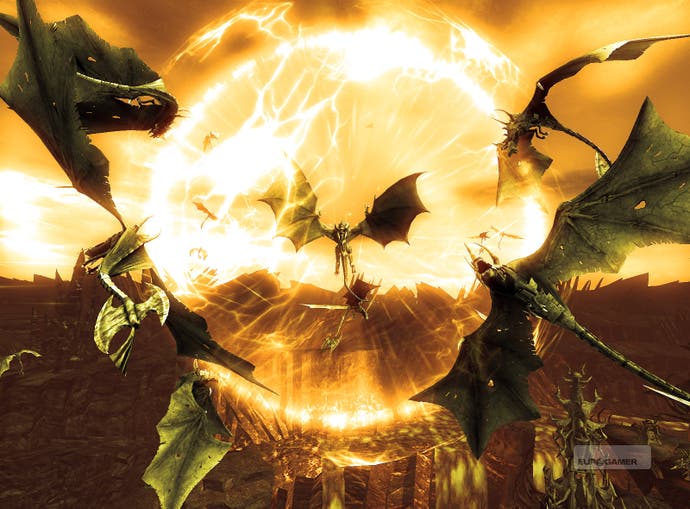Divinity II: Ego Draconis
I put on my robe and lizard's hat.
Seeing as it's coming out in the same month as BioWare's recent dragon-themed RPG, and was produced with a fraction of the development time and budget, there was always going to be a scaly, fire-breathing elephant in the room when it came to Divinity II. It's not really a direct competitor - being an action-based, lone hero take on the fantasy canon as opposed to Dragon Age's tactical party management - but CDV's slant on Wyrm-hunting still sits firmly in the PR shadow of EA's game.
As such, it will probably go unnoticed by a fairly large portion of its target audience. This is a bit of a shame because Ego Draconis represents a decent stab at bringing some fresh ideas to a genre which has, in many respects, become staid and predictable.
Players take on the role of a Slayer, who belongs to an ancient order of warriors dedicated to ridding the world of the half-human Dragon Knights - generally considered to be bad eggs. You weigh in just as your training comes to a close and it's almost time to be imbued with the dragon memories which grant the Slayers their formidable powers.
Things quickly get complicated, however. As a result the player character ends up becoming one of the semi-draconic quarry - turned against their erstwhile allies and forced to pursue the aims of the Dragon Knights instead.
The up side of this, and the hook with which the game pulls you in for a frustratingly large number of hours before delivering, is that you can eventually turn into a fully-fledged dragon - swooping around the large and rather pretty Oblivion-esque rural idylls or burninating desolate mountain passes.
As USPs go, it's a goodie. Dragons are, if you're of a remotely fantastical bent, pretty awesome, and their combination of agility and power makes them perfect for a late-game power boost to keep you interested. More on the dragon later, however, as there's a significant portion of the game to be spent trotting around on more traditional legs first.

At its core Divinity II is an action RPG, with a wealth of stats and skills augmenting the point-and-kill combat model. The use of hotkeys and cooldowns give proceedings a very MMOish flavour, with toe-to-toe combat pretty much unavoidable for even characters specced for ranged engagement.
Action skills tend to be fairly straightforward and immediate, not really requiring the sort of stacking and management which you might expect online. The wealth of progression options - which are split across the categories of priest, mage, warrior, ranger, slayer and later Dragon Knight - are fairly ordinary fare, although well represented.
Each level-up, and the occasional book, grants an extra skill point to be assigned, with an initial maximum of five applicable for each skill. These can be put anywhere, unrestricted by any class system. The result is you can build a very subtle blend of hero, although where you choose to apply the five stat points you receive for each level has a significant bearing on how effective many of these skills will be.








